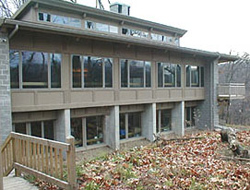Greetings from Clivus Multrum!
In this issue of the Natural Solution News we explore two very different stories of groups using composting toilets to meet their needs. At the Mohican School in central Ohio they've been teaching and conserving with composting toilets for more than a decade. At Ft. Bliss in Texas the Army is saving money and resources by turning to composting toilets on training ranges.
Conservation in the Out-of-Doors
 |
| Dining Hall/Lodge at the Mohican School in the Out-of-Doors* |
Nestled among the maples, oaks and pines of central Ohio is the Mohican School in the Out-of-Doors. The campus, built more than a decade ago, before green building became a business and cultural buzzword, consists of three sustainably designed buildings that serve not only as work, living and gathering spaces but as teaching tools as well.
Founded in 1961 the Mohican School encourages students to learn both academics and environmental appreciation in the great outdoors while applying their class work to the world around them. In the early days, the organization rented space from Ohio State Parks and private camps. Today having a campus of their own offers stability and allows them to expand their program.
| At the Mohican School, over 200,000 gallons of water are saved each 30-week season of the School’s operations. |
The idea of using compost toilets as part of sustainable design was raised early in the planning stages by Mohican officials who had heard about them. Compost toilet owners in similar circumstances were contacted to learn of their experience, and so, too, was the local Clivus Multrum representative, Dick Drouhard. Drouhard was instrumental in planning the design and, especially, in overcoming permitting issues.
The first Clivus system at the Mohican School was a medium sized composter installed in 1996 in the dining hall. Since then, eleven more systems, from small to large capacities, have been installed in the teachers’ quarters and students’ dormitories. All but one of the systems uses a dry toilet, which completely eliminates water for flushing. The school’s one foam-flush toilet uses just six ounces of water per toilet use and allows an additional toilet to be installed in the dining hall without being directly above the composter.
As the first public facility with overnight guests in the state of Ohio to use composting toilets as their primary waste management system, it took a bit of wrangling with the Ohio EPA to gain approval. With guidance from Dick Drouhard, Ohio Clivus representative and experienced wastewater professional, state-wide policy was drafted to establish requirements for acceptable composting toilet systems. Drouhard found that the central EPA region’s inexperience with composting toilets was not consistent with other regions of the state. He turned to the top level of the organization, where they agreed that a statewide policy was best. Among the requirements established at the state level was that compost toilet would have to be listed with the National Sanitation Foundation under Standard 41, which is the case for all Clivus Multrum systems.
Naturally, the school incorporates the composting toilets into their educational programming. Susan James brings students into the basement of the dining hall to take a look at the inner workings of the school’s waste treatment system. According to James, most kids start out holding their nose but quickly realize that there is no odor. They are soon fascinated by the process.
Among the lessons James offers her students is the wastefulness of using potable water for flushing. At the Mohican School, over 200,000 gallons of water are saved each 30-week season of the School’s operations.
To top it off, the compost end-products are being brought to a nearby farm for re-use in agriculture. This means that the lesson for everyone at the Mohican School is that the idea of no-waste is a reality. All we have to do is make it happen.
*image courtesy of Mohican School in the Out-of-Doors
Eliminating Chemical Toilets at Ft. Bliss
 |
| A custom Clivus Multrum M54 Trailhead |
One Year. That’s how long it will take for the savings to pay for the Clivus Multrum composting toilets at Ft. Bliss.
One man’s profound dislike for chemical toilets led to a huge savings for Ft. Bliss in El Paso, TX. Ft. Bliss is a 1,700 sq. mile US Army base, including a number of training sites well beyond the reach of water and sewer lines. Sergeant First Class Dirk Sheffer was in charge of an improvised explosive device (IED) training range where soldiers learn how to recognize IEDs and learn what to do when they see them; today he is on assignment in Asia. Sheffer, who is also a rancher and an enthusiast for environmental protection, was familiar with composting toilets, so he knew there is a better way to go than chemical toilets. He put the idea of compost toilets to Lena Hite, a civilian whose job is to help manage the environment of the training ranges at Ft. Bliss. Hite took on the task of researching what was available commercially and discovering whether or not it would be reasonable economically.
A web search brought her to Clivus Multrum which appeared to her to have just what she wanted: a stand-alone, kit-built, composting toilet system that might be moved if the training site configurations changed, and which wouldn’t require much excavation.
| the numbers show that were they to replace all chemical toilets on the McGregor Range with Clivus Multrum Trailheads, after a few years millions of dollars will be saved. |
Brian Barry at Clivus Multrum informed Hite that the Texas Parks and Wildlife has been using Clivus Multrum M54 Trailheads for years. Hite spoke with people at Texas Parks and Wildlife and learned of their successful experiences with Clivus systems. But when she learned from Barry how much the systems would cost to purchase, install and maintain, she nearly stopped in her tracks. Five Clivus M54 systems would replace approximately twelve chemical toilets at three firing ranges at a tremendous saving.
Hite realized that because the chemical toilet market in El Paso offers very little competition, and because of the twice-weekly maintenance Ft. Bliss was paying for their toilets, they’d start saving money with the composting toilets within a year. Moreover, the numbers show that were they to replace all chemical toilets on the McGregor Range with Clivus Multrum Trailheads, after a few years millions of dollars will be saved.
Hite presented her findings to the commander of the US Army Command & Support (USACAS), the branch of the Army which outfits, owns and cares for training facilities on Army bases. The commanding officer was impressed by the savings and gave the go ahead for funding. Since then USACAS has cancelled its contract with the chemical toilet company at the sites and has plans to turn the whole facility over to composting toilets. Due to Clivus Multrum’s new contract with the General Services Administration future purchases can be made via GSA Advantage.
The first five M54 units were installed by the Army with site supervision by Clivus Multrum in 2008 and put into service immediately. A custom solar system operates the ventilation fan, which keeps the systems odorless. Lights are also provided for night-time training events. Maintenance of the systems, which is far less frequent than the maintenance on the chemical toilets, is handled by Clivus Multrum through a trained, local subcontractor. The experience of the systems by Ft. Bliss staff and soldiers has been excellent. When it becomes necessary to remove the compost end-product from the units, it will be used within a re-vegetation program within the Range. Altogether, it’s a win-win situation. |
